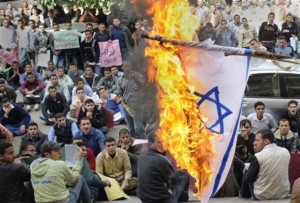The Catastrophe
 On Sunday, May 15th, people across the country and around the world celebrated Israel Independence Day. It was on May 14, 1948 – sixty-three years ago – that Israel’s leaders declared the restoration of Jewish sovereignty in their ancient land after centuries of exile.
On Sunday, May 15th, people across the country and around the world celebrated Israel Independence Day. It was on May 14, 1948 – sixty-three years ago – that Israel’s leaders declared the restoration of Jewish sovereignty in their ancient land after centuries of exile.But for multitudes in the Arab and Muslim world, May 15th is not a day to celebrate. They have a different name for Israel Independence Day. They call it “al-Nakba” – the catastrophe. And indeed, for hundreds of thousands of Palestinians, Israel’s birth did ultimately prove to be a catastrophe. During Israel’s war of independence, approximately 600,000 Palestinian Arabs became refugees. Some fled out of fear of the battles raging in their backyards. Some were forced out by their own leaders. And, yes, some were forced out by the Israeli military.
But here’s an interesting question that the Nakba mourners prefer to dodge: Who started the war? There would not have been one Palestinian refugee – not one – had the Arabs not launched a war of aggression to destroy the Jewish State immediately after its birth. The Jews had agreed to divide the land into two states – one Jewish and one Arab. It was the Palestinians who rejected this compromise and tried to conquer all of the land for themselves.
There’s an old Jewish joke that the definition of chutzpah (“nerve”) is to murder your parents and then throw yourself on the mercy of the court as an orphan. The same applies to those who attacked Israel in an effort to destroy it and then complained about the manner in which Israel dared to defend itself.
Here, for example, is how Palestinian President Mahmoud Abbas described these historic events in an op-ed published in today’s New York Times. “It is important to note that the last time the question of Palestinian statehood took center stage at the General Assembly, the question posed to the international community was whether our homeland should be partitioned into two states. In November 1947, the General Assembly made its recommendation and answered in the affirmative. Shortly thereafter, Zionist forces expelled Palestinian Arabs to ensure a decisive Jewish majority in the future state of Israel, and Arab armies intervened. War and further expulsions ensued.”
Not even close, Mr. President. When the United Nations recommended dividing Palestine into two states – one Jewish and one Arab – in November, 1947, the Jews not only accepted the compromise, but they danced in streets with joy. It was the Palestinians who rejected the deal. Within hours of the United Nations vote, they launched a civil war against Jewish towns and cities across the country. When the Israelis survived this initial onslaught and declared their independence on May 14th, 1948, they once again celebrated. The next day, five Arab armies invaded Israel in an effort to finish the job the Palestinians had started.
In each case, Israelis made a choice. They decided to fight for their survival. This meant taking up arms and using them. The one thing all veterans can agree upon is that war is hell. And wars also have consequences. Just ask the mothers of the one percent of Israel’s population who fell in this war of Arab aggression. These boys (and in many cases girls) never came home. They have no right of return.
Israel isn’t perfect. It’s important to criticize the mistakes Israel makes in its struggle to survive. It’s fair to point out that the Israelis – who are men, not angels – committed some atrocities as they frantically fought for their survival. But to overlook the context within which these battles took place sheds no light. It’s D-Day without the Nazi Blitzkrieg. It’s Iwo Jima without Pearl Harbor. It’s less than half the story. And it’s a lie.
As Nobel Peace Laureate Elie Wiesel has noted, the Palestinian people do have good reason to be angry. But they shouldn’t be angry at Israel. They should be angry at their grandparents who could have had a Palestinian state back in 1948 but chose not to compromise. And, I would add, they should be angry at their parents who could have had a Palestinian state in 2000 and again in 2008 (when offered by Israeli Prime Ministers Barak and Olmert, respectively) but likewise refused to compromise.
Why was Israel’s birth a catastrophe for so many Palestinians? Because the Palestinians lost the war that they started to destroy Israel. Had they chosen a different path – the path of peace and mutual recognition — May 15th would have had a different name. It would be known today as Palestinian Independence Day.
David Brog is the executive director of Christians United for Israel and author of a new book, In Defense of Faith: The Judeo-Christian Idea and the Struggle for Humanity. You can follow David on Facebook by clicking here and on Twitter by clicking here.

No comments:
Post a Comment